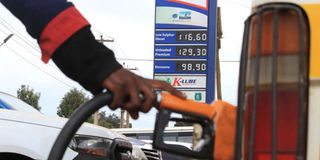Fuel prices: Pain at the pump set to get worse

An attendant fuels a matatu at a petrol station in Nyeri County on September 2, 2018. PHOTO | FILE | NATION MEDIA GROUP
What you need to know:
One is increasing the general VAT rate to 18 percent, hurting the ordinary citizen as much as the tax on petroleum products.
Treasury expected to raise Sh71 billion from the fuel tax.
Analysts say the Treasury should broaden its tax base and cut on spending in order to control the budget deficit, which is around Sh559 billion this year.
Kenyans hoping President Uhuru Kenyatta to delay the implementation of the 16 per cent tax on fuel should be ready for another shocker as the National Treasury fights to have its way.
Assenting to the amendments made by MPs to delay the 2013 Value Added Tax law until 2020 would leave a gaping hole in the budget for which the Treasury has two alternatives to fill. One is increasing the general VAT rate to 18 percent, hurting the ordinary citizen as much as the tax on petroleum products. Treasury expected to raise Sh71 billion from the fuel tax.
Without it, the target from VAT would be drop to Sh399 billion, assuming the Kenya Revenue Authority is perfect in its performance.
SPARE FUEL
Should Treasury opt to raise VAT on products already in the net to 18 per cent and spare fuel, it would realise an extra Sh49 billion but remain with a Sh22 billion hole.
That would probably be filled through borrowing, the second option National Treasury Cabinet Secretary Henry Rotich has.
Both would be unpopular as Kenyans believe the national debt, standing at Sh5.1 trillion, is the main reason for the heavy taxation, which is undermining the ability to generate wealth.
“If the measure is not implemented, it will require alternative financing either through borrowing or additional tax measures, including reviewing the VAT rate to 18 percent, like the other East African Community countries,” a Treasury paper seen by the Nation says.
INCREASE FARES
The options under consideration came to light as the impact of the fuel VAT hit homes and businesses countrywide. Outrage greeted the increase in matatu fares on Monday.
Elsewhere, operations at Mumias Sugar Company are expected to grind to halt if the firm fails to review the contracts for transporters. That would mean less money going to farmers for the cane sold. With jet fuel also affected by the tax, air tickets will go up.
The Energy Regulatory Commission is also expected to hit consumers with electricity tariff increases in fuel cost adjustments that are usually loaded to bills.
Before the VAT increase on September 1, the fuel cost adjustment was Sh2.50 per unit.
Should the President not indulge Kenyans, attention will turn to the courts where Mr Okiya Omtata has filed a case seeking to stop the increase.
HIGHER ENERGY PRICES
The tax measure is expected to lead to a new round of retail price inflation as a result of higher energy prices that will impact on the cost of production, transport and electricity.
Economists expect the wave of consumer price increases to slow the demand for goods and services, meaning Kenyans’ purchasing power would be eroded.
The inflationary stress may also exert pressure on the shilling.
With diesel accounting for about 40 per cent of the fuel products sold in Kenya and chiefly used in public and cargo transport, the increase is bound to affect every aspect of life.
Analysts say the Treasury should broaden its tax base and cut on spending in order to control the budget deficit, which is around Sh559 billion this year.
The pain of higher fuel costs will be borne by Kenyans who are already saddled with VAT on essential goods such as cooking gas, electricity, exercise and text books as well as mobile phones.




